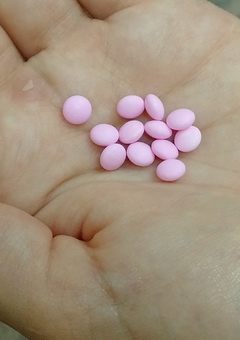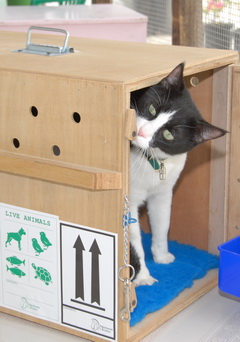a lot about travel boxes
We have big travel boxes, small travel boxes, pre-manufactured ones and wooden ones ~ and of course our wooden ones are made-to-measure for any type of animal.
Whichever box you're going to use, ours or from some other supplier or even one you've used before, you really need to ensure that it meets current IATA standards or it might not be accepted by the airline.
And if all the information below just isn't enough for you (you virtuoso, you!), then you might want to peek at this too:
- The Science of Travel Boxes & Measuring Your Pet
- Illustration of Measuring Your Dog
- Short-Nosed Dogs and Air Travel
-
Need a travel box for Other Creatures Too?
IATA Standard Travel Boxes
Yes, an important reason to use an IATA standard travel box is to ensure that it will be accepted by the airline, but also, perhaps obviously, in order to make sure your pet travels safely. A good box will mean that your pet has enough space inside but not too much space, and that it will be a strong enough box to withstand the rigours of shipping. What makes a strong box? Well, there are many things that go into it but you can start understanding by looking at the images below, and of course you're welcome to contact us for more detail if you feel unsure.
DKC Wooden Travel Boxes
These are not just throwaway boxes; extremely well-built and strong, we often see return customers still using boxes we built for them years earlier. Also, since they're made-to-measure and therefore fit your pet more precisely than a pre-manufactured box will, the cost of your pet's air waybill (i.e. the flight ticket) will almost always be significantly lower using a wooden box than it will be with a pre-manufactured one because air waybills are primarily charged on size, not weight. Since there are only a small variety of sizes available with pre-manufactured boxes, this means that your pet will usually be in a larger one than is usually necessary.
The downside? (Yes, there is a downside.) These boxes, although very durable, may not last quite as long as a high-quality pre-manufactured box and, because wooden boxes are not collapsible, they're also more difficult to store.

Pre-Manufactured Travel Boxes
SkyKennels or VariKennels are the best of this breed, but there are others too. The image to the right shows just one example of a very good polypropylene box, which comes in several sizes. The advantages of this kind of box over a wooden one include very great durability if cared for properly, as well as ease of storage because they can be disassembled.
The downside, however, is that except for cat-sized boxes which are always good value, the larger of these types of travel box are more expensive to purchase than a comparably-sized wooden box and almost always result in a costlier air waybill, often significantly so.
~ ~ ● ~ ~
Tough decision? Well maybe not sooooo tough. In the end, it's most important to know that both types of box, if high-quality, are equally safe, comfortable and capable for your pet's travels. Ultimately, the choice comes down to your personal preference and your perception of the impact of the choice of box on the final cost of the entire shipment.
We can help you get through this particular maze.
~ ~ ● ~ ~

Wooden Travel Boxes for the Entire Family!
Well, maybe not the ENTIRE family!
We also manufacture wooden made-to-measure boxes for birds, like the one to the right, or any other box you might need for any type of animal, because we know that where the family goes, the mouse, hamster, guinea pig, snake, ferret and pet rock must go too!

Not-so-IATA Standard Travel Boxes
There are A LOT of different travel boxes out there, both wooden and plastic, and maybe you already own one. This particular box (to the right) is usually used for light transport, perhaps to bring your pet to the vet. While it's probably fine for such purposes (though not definitely, so be careful), there are several reasons (at least!) why it would not be good for air transport, including insecure hinges and fasteners which make both the door and the box itself very susceptible to unexpectedly prying open under moderate pressure, as well as weak and often brittle plastic.
Do be careful!











